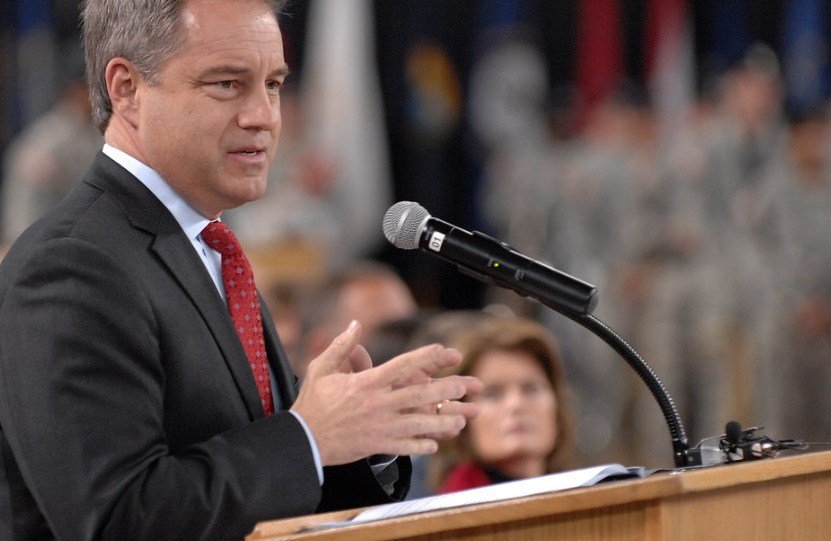Alaska Governor Mike Dunleavy has introduced a bill that would criminalize unpermitted public protests and other activities that block passage through public places. The bill would also allow drivers to sue protesters for damages and increase penalties for trespassing and obstructing highways.
What the bill proposes
The bill, titled “An Act relating to obstruction of free passage in public places; relating to criminal trespass; relating to criminal mischief; relating to obstructing a highway or navigable water; and providing for an increased penalty for obstructing a highway or navigable water”, was introduced by Dunleavy on Wednesday, February 21, 2024.
The bill would create a new crime of “obstruction of free passage in public places”, which would apply to anyone who “knowingly renders a public place impassable or passable only with unreasonable inconvenience or hazard”. The bill defines a public place as “any place to which the public or a substantial group of the public has access and includes, but is not limited to, highways, transportation facilities, schools, places of amusement, parks, playgrounds, and the common areas of public and private buildings and facilities”.

The bill would make obstruction of free passage in public places a class A misdemeanor, punishable by up to one year in jail and a fine of up to $10,000. However, the offense would be elevated to a class B felony, punishable by up to 10 years in prison and a fine of up to $100,000, if the obstruction:
- interferes with the delivery of emergency services or the response of emergency vehicles;
- creates a substantial risk of physical injury to another person;
- involves the use of a dangerous instrument;
- is committed by a person who has been previously convicted of the same offense or a similar offense in another jurisdiction.
The bill would also allow drivers who are affected by an obstruction of free passage in public places to sue each person who participated in the obstruction for damages. The bill specifies that the damages would include:
- $10,000 for each hour or part of an hour that the driver is delayed or inconvenienced by the obstruction;
- the actual damages sustained by the driver as a result of the obstruction, including lost wages, medical expenses, and property damage;
- punitive damages of up to $500,000 if the obstruction results in the death of a person.
The bill would also hold organizers of an obstruction of free passage in public places liable for the damages, even if they did not directly participate in the obstruction.
Why the bill was introduced
Dunleavy said in a news release that the bill was meant to ensure that public spaces remain accessible and safe for all Alaskans.
“Alaskans have a constitutional liberty interest in freely moving about the State,” Dunleavy said in a letter to the Legislature announcing the bill. “This bill protects that interest by ensuring that public places are not rendered impassable or passable only with unreasonable inconvenience or hazard by persons who seek to obstruct the free passage of others.”
Dunleavy also said that the bill was inspired by the recent protests in India, where farmers have blocked highways and roads to demand the repeal of new agricultural laws. Dunleavy said that such protests have caused “massive disruptions” and “endangered lives”.
“Alaska cannot afford to have its critical infrastructure and public places shut down by unlawful protests that threaten public safety and commerce,” Dunleavy said.
How the bill has been received
The bill has been referred to the House Transportation and Judiciary Committees for further review. However, it has already drawn criticism from civil liberties groups and some lawmakers who say that it violates the right to free speech and assembly.
The American Civil Liberties Union of Alaska said in a statement that the bill was “an unconstitutional attempt to silence dissent and criminalize peaceful protest”.
“The right to protest is fundamental to our democracy and protected by the First Amendment,” the ACLU of Alaska said. “This bill would chill free expression and deter people from speaking out on issues that matter to them. It would also create a dangerous precedent for allowing the government to punish people for their political views and affiliations.”
The ACLU of Alaska also said that the bill was unnecessary and redundant, as there are already laws in place to address unlawful conduct during protests.
“Alaska already has laws that prohibit blocking traffic, trespassing, vandalism, and other crimes that may occur during demonstrations,” the ACLU of Alaska said. “These laws are sufficient to protect public safety and order, without infringing on the rights of protesters.”
Representative Zack Fields, a Democrat from Anchorage, said that he opposed the bill and that it was “a waste of time and resources”.
“This bill is a solution in search of a problem,” Fields said. “Alaska does not have a history of widespread civil disobedience that disrupts public places. This bill is just a political stunt to distract from the real issues facing our state, like the budget crisis, the pandemic, and the climate change.”
Fields also said that the bill was “an attack on democracy and the rule of law”.
“This bill would undermine the checks and balances that are essential to our system of government,” Fields said. “It would give the governor the power to declare any protest he doesn’t like as a felony, and to sue anyone who disagrees with him. This is not how a free society works.”

Comments